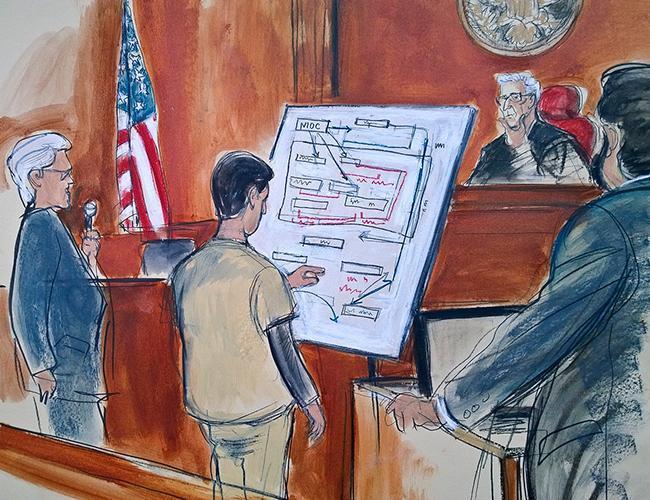
Turkish-Iranian businessman Reza Zarrab has claimed that he paid millions of dollars in bribes to a former Turkish economy minister to facilitate illegal gold transactions with sanctions-hit Iran.
Zarrab had been due to go on trial in Manhattan federal court, but the prosecution made clear that Zarrab was, instead, their star witness.
The lone man in the dock is now a former deputy general manager Turkey’s state-run Halkbank, Mehmet Hakan Atilla, who is accused of violating sanctions against Iran, bribery and money laundering.
Zarrab testified that he met former Economy Minister Zafer Çağlayan in 2012 as he sought to establish himself as the prime intermediary in lucrative gold traffic involving Turkish and Iranian banks.
The gold-for-oil operation enabled Iran to use revenue from its oil sales for payments on global markets despite the prohibition against U.S. banks doing business with Tehran.
Çağlayan offered to help Zarrab become the principal go-between for the Turkish public bank Halkbank, Zarrab testified.
“I can help with this provided there is a profit share of 50-50,” Çağlayan said, Zarrab claimed in his testimony.
He told the court that he paid 45 to 50 million euros ($53.5 to $59.4 million) plus approximately $7 million in bribes to the minister between March 2012 and March the following year.
Çağlayan resigned from the Turkish government at the end of the 2013 corruption probe targeting high-ranking government officials.
In 2015, Turkey’s parliament voted against putting Çağlayan and three other ex-ministers on trial on accusations of bribery and influence-peddling, with the government blaming the prosecutors involved in the process of being members to the network of U.S. based Fethullah Gülen.
Gülen is the leading suspect in cases into July 15, 2016 military coup attempt.
The acquitted ministers were accused of receiving bribes from Zarrab to facilitate U.N. sanctions-busting trade with Iran and other deals.
U.S. authorities, however, in September this year charged Çağlayan and eight other people with carrying out hundreds of millions of dollars in transactions benefitting Iran and Iranian entities in violation of U.S. sanctions.
Attila is the only one of the nine currently on trial.
Zarrab testified on Nov. 29 that Attila helped to doctor the trade so that the Iranian origin of the funds would be undetectable by U.S. banks.
Zarrab also claimed he helped Iran use funds deposited in Halkbank to buy gold, which was smuggled to Dubai and sold for cash.
During the hearing he used a multicolored diagram to illustrate the complex series of transactions he said he used to avoid scrutiny of U.S. banks and regulators. He explained how he falsified customs documents to make it appear that gold was bound for Iran, rather than Dubai.
Zarrab said Atilla was “the most knowledgeable person about the sanction rules” at Halkbank, and that he helped develop the scheme. He said Atilla and Halkbank’s then-general manager, Süleyman Aslan, instructed him how to carry it out.
“He made sure that the system and method worked,” Zarrab said of Atilla.
Zarrab testified that before working with Halkbank, he handled Iranian transactions through Turkey’s Aktif Bank. He said the bank initially refused to let him open an account, but relented after Zarrab asked Egemen Bağış, then Turkey’s EU minister, for help.
Zarrab said Bağış set up a meeting between him and Aktif Bank’s general manager and that he was then allowed to open an account. However, Aktif Bank later shut down the account after receiving a warning from the United States, Zarrab said.
During the hearing Zarrab said he did not “tell the truth completely and transparently” to the FBI as he “did not know” what he would “come across” and “felt scared” when he was detained in Miami last year.
He said he accepted all the charges he is accused of and that he agreed to cooperate with the U.S. prosecutors because it was “the best way to be released from jail.”
Stating that no one promised him a certain penalty, he said he was watched by the FBI for the past few weeks.
His testimony is scheduled to continue on Nov. 30, with a possible cross-examination from the defense on Dec. 1.